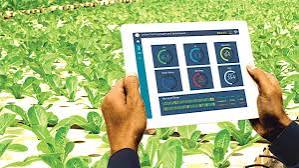In recent years, Nigeria has faced an escalating crisis in food production, leading to widespread hunger and deprivation across the nation. With an estimated population of over 200 million people, the demand for increased food production has never been more urgent. The current situation is exacerbated by factors both internal and external, creating tension and uncertainty among citizens.

The phrase “A hungry man is an angry man” captures the essence of the unrest that is beginning to surface in various parts of the country. Smallholder farmers, who traditionally provide the backbone for Nigeria’s food security, are struggling to meet the growing demands. This is due to several challenges, including the use of outdated farming implements and a lack of essential infrastructure such as roads, electricity, potable water, and healthcare facilities in rural areas.
Furthermore, the rapid population growth and the influx of graduates from higher institutions have heightened the pressure on agriculture to not only provide food but also create employment opportunities. However, the reality is that agriculture, in its current state, cannot sustain the demands of Nigeria’s burgeoning population.
Insecurity is another critical issue hampering agricultural productivity in Nigeria. Many farmers have been displaced from their lands due to violence from herdsmen, bandits, and kidnappers, forcing them into Internally Displaced Persons (IDP) camps. This displacement disrupts farming activities, leading to reduced food production and higher prices for food items, which are increasingly becoming unaffordable for average Nigerians.
To address these challenges, the Nigerian government must declare a state of emergency in food production and invest significantly in modern agricultural technology. By doing so, farmers and investors will be encouraged to transition from primary production to agro-processing, thus enhancing the value chain and boosting food security.
The government can facilitate this transition by investing heavily in the procurement of agricultural machinery, equipment, and inputs, and by providing subsidies to make these resources accessible to farmers. Import duty waivers on processing machinery and equipment can also help reduce costs and encourage investment in agriculture.
Smallholder farmers, who often lack the funds to purchase machinery for commercial agriculture, require government support to overcome these financial barriers. The Federal Government should move beyond rhetoric and implement tangible investments in agricultural technology. This includes providing access to funding and resources that make agriculture attractive to young people and graduates.
One practical approach is for governments to procure expensive machinery, such as tractors and harvesters, and make them available to genuine farmers at subsidized rates. This will enable farmers to engage in large-scale farming, which is essential for meeting the nation’s food demands.
Land tenure systems in many states currently hinder the deployment of technology for commercial agriculture. State governments should consider acquiring land for crop farmers to facilitate large-scale farming operations. This will allow the use of heavy equipment and technology to increase food production significantly.
Several state governments have already taken steps in this direction, but more needs to be done. States should invest in technologies and inputs that are beyond the reach of poor farmers and offer them at affordable rates. Additionally, private investors should collaborate with state governments to boost the production of agro-processing equipment, enabling farmers to add value to their produce and increase profitability.
To unlock the full potential of agriculture and diversify Nigeria’s economy, the government must create an enabling environment through relevant policies and laws. By providing incentives and training for entrepreneurship in agriculture, the nation can develop and transform agricultural value chains, creating new income opportunities and adding value to commodities through agro-processing.
Embracing intelligent farming and leveraging technology are crucial steps toward achieving food security and economic diversification in Nigeria. By addressing the challenges facing agriculture today, the nation can pave the way for a more prosperous and sustainable future.



